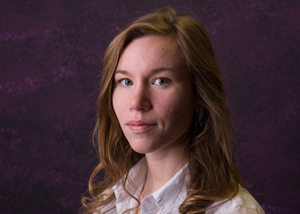Sources: Lindsay Ahalt, lonley@k-state.edu;
and Elizabeth Fallon, 785-532-7287, efallon@k-state.edu
Photo available. Contact media@k-state.edu or 785-532-6415.
Video available. Access at http://www.k-state.edu/media/audio/podcasts/gordon2.mov
Download information is available at http://www.k-state.edu/media/audio/podcastindex.html
News release prepared by: Kristin Hodges, 785-532-6415, khodges2@k-state.edu
Wednesday, March 11, 2009
K-STATE STUDENT FINDS THAT MANY PRACTICING HEALTH CARE PROVIDERS WOULD BENEFIT FROM TRAINING TO BE CULTURALLY COMPETENT WHEN COUNSELING PATIENTS
MANHATTAN -- Research by a Kansas State University student shows that health care providers could benefit by learning how to adjust patient counseling for people of different cultural backgrounds.

Lindsay Ahalt, a senior in anthropology, biology, microbiology and premedicine from Jefferson, Md., thought there should be a more appropriate medical approach that focuses on treating the individual and not just the symptoms.
If you don't have an awareness of your patient's body and you treat patients all the same, there's going to be a loss of relationship, trust and respect," Ahalt said.
Ahalt is working with Elizabeth Fallon, assistant professor of kinesiology at K-State, to address widespread disparities in health care by studying health care providers' perceptions of their cultural competency.
"The greatest financial burden to our health care system is preventable chronic diseases like obesity, heart disease and diabetes," Fallon said. "Many minority patients report a lack of cultural competence among health care providers, which may affect the providers' ability to provide effective counseling for the lifestyle changes necessary to prevent chronic disease."
Ahalt said an example is when counseling patients about their diet. If you tell them what to eat to be healthy without factoring what they typically eat in their culture, the chances of them adopting the lifestyle change are slim.
Ahalt studied the results of a public health survey sent to 2,697 doctors, physician assistants and nurses in Kansas that asked if they thought they were culturally competent to counsel patients of other races or ethnicities, and if in counseling for preventative health care behaviors, like diet, exercise and weight management, they changed or modified their approach based on patient ethnicity. The questions also asked if they thought more training should be available to increase cultural competence among health care providers, and if they would be willing to attend additional trainings if they were made available.
The surveys were sent randomly, though they were controlled to exclude health care providers not likely to counsel patients on preventable chronic diseases, such as anesthesiologists and neurologists. Ahalt said the response rate was about 14 percent. She found that 55 percent of the health care providers thought they were confident in their cultural competencies needed to effectively counsel their patients. Additionally, 68 percent of health care providers agreed they would attend trainings to improve their counseling skills and cultural competency. She also found that if training were made available, women, nurses, physician assistants and younger health care providers would be most likely to attend.
Ahalt's project is for K-State's McNair Scholars Program, which prepares undergraduate students for graduate school. She presented her research at the California McNair Symposium at the University of California at Berkeley in July 2008, and again at the MKN McNair Heartland Research Conference in Kansas City, Mo., in September 2008. She said the next step is to publish her work.
Ahalt has been involved with several areas of research at K-State. For her religion in culture anthropology class, she traveled to Wichita to study the Church of Scientology. In her Native American Indian anthropology class, she traveled around the United States and studied cross-historical perspectives of Native American boarding schools.
"All of those experiences have given me a real appreciation for the fact that research is not just research," Ahalt said. "It's very active, and you can make proactive things happen because of it. Without research, programs and policies wouldn't be established because you wouldn't know what those issues are or how to address them."
Ahalt plans to attend graduate school to study medical anthropology. She would like to attain an M.D./Ph.D. and eventually teach at the collegiate level, incorporating her ideas on cultural competence. For her doctorate, she would like to study cross-cultural conceptions of health and healing by studying at an Indian hospital, where Western and non-Western methods of healing exist.
Ahalt, who has a 5-year-old son, Jaden, started the Parents as Students Support Group at K-State. She also is a member of Students for Environmental Action and the Anthropology Club. She is a 2001 graduate of Brunswick High School in Brunswick, Md.